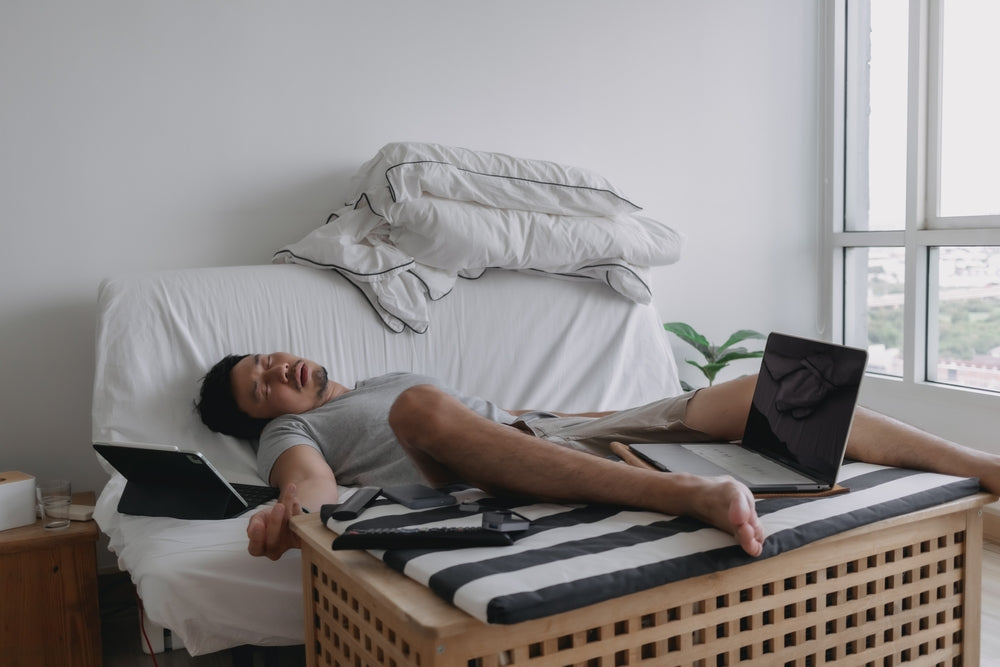Free U.S. Shipping On Orders Over $150

How to Sleep Well When You Work From Home: Sleep Tips for Remote Workers
Posted on
The Covid-19 pandemic saw a lot of people shift to remote work, and many of us still work from home. Since then, sleep and health researchers have noticed something. Sleep quality for a lot of people has gotten worse.
This is surprising because you’d think that working from home gives you greater freedom over your time. With no commute to eat into your evening hours, you can go to sleep early and get plenty of shut-eye. That’s not the case for a large number of remote workers.
The change from having a separate home and work life to spending the entire day at home seems to be bad for sleep. In this post, we take a closer look at why remote workers struggle with sleep and how to sleep well when you work from home.
Why Remote Work Can Be Bad For Your Sleep
Working from the office provides structure and predictability. You have to wake up at a certain time, you come back home in the evening and you know you have to be asleep by a specific time if you want to get enough sleep.
It’s also easier to schedule things like exercise and social activities either in the morning or evening.
Working from home involves a looser structure and frequent interruptions that make it harder to maintain a strict routine. So you find you go to sleep and wake up at different times each day, don't have a regular time for exercise and even your meal times may no longer be predictable.
This messes up with your circadian rhythm as we explained in a recent post. This leads to insomnia, fragmented sleep and sleep deprivation.
In addition to the loss of routine, other factors that can make working from home harder on sleep quality include:
- Working at home blurs the line between work and personal time. People tend to work more and for longer. Work overload and the related stress can worsen sleep quality.
- Lack of social interaction, which can lead to higher levels of stress and anxiety, and also increases the risk of depression. All these mental disorders can worsen insomnia and other sleep problems.
- Some people spend less time outdoors when they work from home. Going outdoors and getting exposed to sunlight is important in maintaining a well functioning circadian rhythm. which helps you sleep better at night.
- Many remote workers tend to be less active as well, which doesn't do any good to sleep quality.
5 Tips To Sleep Well When You Work From Home
If you work from home or plan to sometime in the future, here are five tips to help you sleep well each night.
1. Have a Structure for Your Workday
Structuring your workday is not just important for productivity, it also helps you maintain a work life balance, which you especially need when working from home.
Having a structure ensures you don't find yourself working late into the night or burning out from work overload.
Decide what time you start work, when you take breaks and what time you finish work. Be strict with your work structure to prevent it from mixing with your family and personal time.
2. Have an Evening and Bedtime Routine
You also need to structure your non-work time. When it comes to sleep, your evening and bedtime routine are especially important. It helps you wind down and get ready for sleep.
A good evening routine includes an early (and light) dinner, turning off electronics an hour before bed, and an activity to help you relax whether it’s meditation, reading or knitting. Try to go to bed and wake up at the same time each day.
3. Go Outside and Get Active
Spending time outdoors makes you more alert and energetic. This helps your circadian rhythm run more smoothly, which includes helping you get sleepy at night. Outdoor time also reduces stress and anxiety, helping fight insomnia.
In addition, get some exercise each day whether it’s an intense run or a brisk walk. Working out increases sleep drive, or the need for sleep. This makes it easier to fall asleep at night.
4. Make Time for Socializing
Social life is one of the things most affected by remote work. But for the sake of your mental health and sleep quality, you need to make time for friends and family. It reduces loneliness, anxiety, stress, insomnia and the risk of depression.
5. Protect Your Sleeping Space
Keep work out of your bedroom. The last thing you want is to associate your bedroom with the stress of work or have work stuff lying around.
A neat, clutter-free space will make it easier to relax and fall asleep. In addition, keep your bedroom dark, cool and silent. Make your bed comfortable as well with a good mattress and high quality bedding like our Jax Sheets.
Quick links
Contact
6063 Hudson Road #160
Woodbury, MN 55125
Yo@hercLeon.com
Leave a comment: